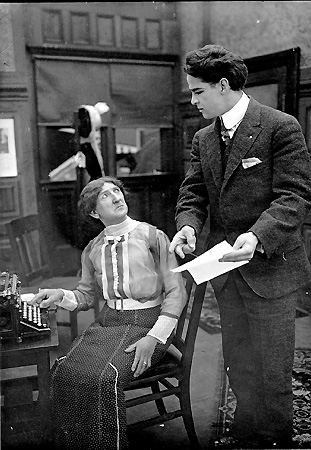 Volume II: Filmography
Volume II: Filmography Volume II: Filmography
Volume II: Filmography

Riley Camberlin is "Rosie" and William Russell is her boss in ROSIE'S REVENGE. Courtesy Academy of Motion Picture Arts and Sciences (X-130)
April 27, 1913 (Sunday)
Length: 1 reel
Character: Comedy
Cast: Riley Chamberlin (in a female role as Rosie, the clever cook), William Russell (Rosie's office boss), James Cruze (the rival), Florence LaBadie (the widow)
Note: The title was given erroneously as Rosa's Revenge in The Motion Picture Story Magazine, September and October 1913.
ADVERTISEMENT, The Moving Picture World, May 3, 1913:
She attempted to be a stenographer and found herself 'at liberty' so quick it made her head spin; but she got a job as a cook and made her first employer rue the day he had discharged her. It was all in the meal she cooked for him!
ARTICLE, The Moving Picture World, May 10, 1913:
DID ROSIE DO THE RIGHT THING? Rosie is a Thanhouser comedy product, a stenographer turned cook. In Rosie's Revenge, you see why she had to become a cook. She was a bum stenographer! Bill Scroggins, by whom she was employed, needed an amanuensis who could amanuense. So he told Rosie to run along and find a job as dishwasher. But Rosie looked higher than that. She got the job of cook. Her mistress was a handsome society woman whom Bill Scroggins courted. So did another fellow. One day Rosie's mistress had the rivals to dinner, and Rosie put red peppers and things into rival Scroggins' food. Now, did Rosie do the right thing? Of course, Scroggins made such a mess of himself at the table that he never had the nerve to come back to court Rosie's employer. So weigh this question carefully in your minds.
SYNOPSIS, The Bioscope, July 3, 1913:
Rosie is engaged in an office and is dismissed without cause. She accepts a situation as cook, and meets her late employer at her mistress' house. Her revenge is novel and complete . Released shortly.
SYNOPSIS, The Moving Picture World, May 3, 1913:
Rosie was born and brought up on a farm, but had longings for the gay life of the city. She was not pretty, far from it; in fact even she realized there would be no place for her on the stage, except in support of the Cherry Sisters. She couldn't be an artist's model, or a grand opera singer, so she compromised on stenography. The station agent in their village (he was a distant relative) gave her two lessons and then she went forth to conquer the metropolis. Rosie got a job. No one could ever explain how she did it. Her tenure of office work was one hour and seven minutes, at the end of which time she was discharged for incompetency. She blamed her employer and vowed vengeance. It must be admitted that he talked harshly to her, but on the other hand it cannot be denied that Rosie's work on the typewriter was pretty coarse. She tried for other positions, but did not succeed in landing one. When her money ran out she was induced to take a position as cook in a private family and there demonstrated that she was in her proper sphere. As a typewriter Rosie was an insult, as a cook, she was a delightful dream.
Ten years after her one essay at office work, Rosie was employed by a wealthy young widow, who lived alone in the country. The widow had a suitor, a clean-cut young businessman, and Rosie heartily approved of him. Then one day Rosie's former employer appeared. It developed later that he hoped to retrieve his fortunes by marrying the widow, who was a friend of his sister. He was received graciously, but Rosie determined to get rid of him without delay. She was an excellent cook, and she easily accomplished her purpose. The poor man had a most horrible meal, and could not understand how the widow and the other suitor enjoyed it. He did not know that he was partaking of a special diet, but the little he ate worried him, and he finally fled from the house, never to return. The widow in time married the merchant and they retained Rosie, who became even a better cook as the years passed by.
REVIEW, The Morning Telegraph, May 4, 1913: This review is reprinted in the narrative section of the present work.
REVIEW, The Moving Picture World, May 10, 1913:
A very commendable effort at comedy, in which Riley Chamberlin plays the part of an old maid's stenographer and cook. Her employer discharges her from the first place (she was 'fired' the subtitle very slangily stated), and 10 years later she is the cook in his sweetheart's home. The manner in which Rosie obtains her revenge by doctoring the broker's food is very funny and will bring several laughs from the average audience.
REVIEW, The Moving Picture News, April 26, 1913:
Rosie's Revenge, with Riley Chamberlin in the lead, is good. As a comedy it is one of the best recently presented.
# # #
Copyright © 1995 Q. David Bowers. All Rights Reserved.